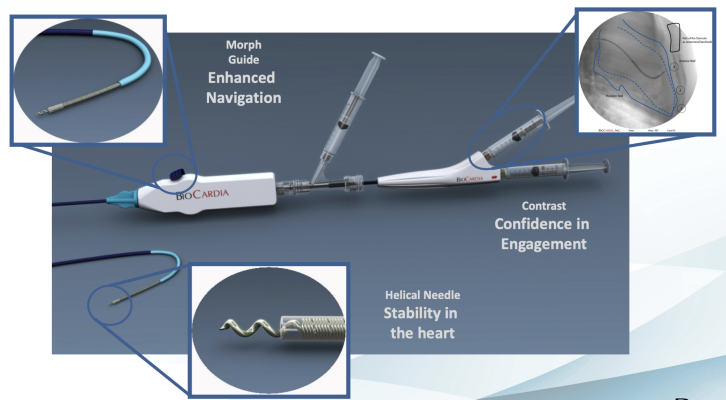
October 12, 2023 — BioCardia, Inc., a developer of cellular and cell-derived therapeutics for the treatment of cardiovascular and pulmonary disease, today announces completion of enrollment in its CardiAMP Heart Failure Trial and initiation of a discussion with the FDA on a second pivotal study protocol adapted for the responders in the initial trial with the objective of gaining FDA marketing approval.
As previously disclosed, interim trial results reviewed by the Data Safety Monitoring Board (DSMB) in July 2023 indicated that the Phase III CardiAMP Heart Failure trial is not likely to meet the primary endpoint for efficacy at 12 months, in part, because both study groups of randomized patients have had good outcomes. There were no treatment emergent safety concerns by the DSMB. Notably, patients receiving CardiAMP Cell Therapy followed up to 24 months showed a 37% relative risk reduction of cardiac death equivalents and an 18% relative risk reduction in major adverse cardiac and cerebrovascular events (MACCE).
For an important subset of patients with higher levels of NT-proBNP, a well-established biomarker of increased heart failure and stress to the heart, the benefits were even greater. In patients with NT-pro BNP levels greater than 500 pg/ml at baseline, an analysis of all available data up to two years shows improvements over controls including a 59% relative risk reduction in mortality [13% reduction in all-cause death and cardiac death equivalents with CardiAMP therapy (9%) over the control group (22%)] and a 54% relative risk reduction of MACCE [21% reduction with CardiAMP therapy (18%) over the control group (39%)]. Further, all clinical outcomes included in this analysis favored therapy including: quality-of-life as measured by the Minnesota Living with Heart Failure Questionnaire, NT-proBNP, Six Minute Walk Distance, left ventricular ejection fraction, left ventricular end systolic volume, and left ventricular end diastolic volume.
BioCardia, with its clinical leadership, has developed a modified study design anticipated to have a high probability of success based on existing data and has initiated discussion with the FDA. The proposed CardiAMP Heart Failure II study includes the requirement that all patients have an NT-proBNP at baseline greater than 500 pg/ml and has a modified primary endpoint. The new endpoint is a similar hierarchical composite endpoint consisting of all-cause death, the cardiac death equivalents of heart transplant and left ventricular assist device (LVAD) implantation, heart failure hospitalizations, worsening heart failure events treated as an outpatient, and change in quality-of-life with a follow-up duration ranging from a minimum of 12 to a maximum of 24 months. This endpoint is nearly identical to other ongoing clinical studies of other therapies for this indication which also utilize NT-proBNP threshold inclusion criteria. Statistical calculations for this clinical study design support that a modestly sized clinical trial, based on the interim results, would achieve high power (probability of success). Additional modifications to the trial design proposed include elements to simplify clinical logistics and reduce the cost of performing the study.
“Together with our clinical partners, we have completed enrollment in the largest autologous cell therapy study for heart failure ever performed, with no treatment emergent safety concerns from the DSMB and interim results with both improved survival and reduced MACCE in the treatment group,” said BioCardia CEO Peter Altman, PhD. “Our world-class clinical leadership is supportive of pursuing the compelling and consistent interim results for patients with elevated NT-proBNP at baseline. The data supports that if we had focused on this subset of patients with the updated composite endpoint, we should have met the primary endpoint in the study.” He continued, “With FDA alignment on the plan forward, we intend to secure the means required for the second study through the established Medicare reimbursement and partnering.”
For more information: www.biocardia.com


 February 03, 2026
February 03, 2026 









